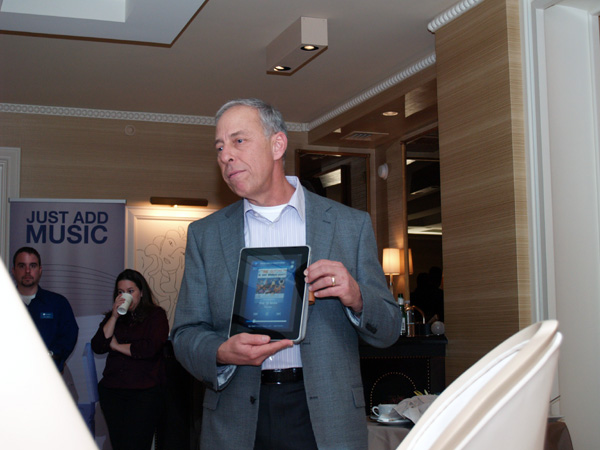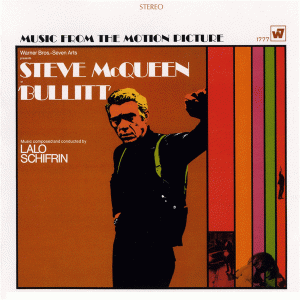"The digital music business has been a war of attrition that nobody seems to be winning," said David Goldberg, the former head of Yahoo music. "The CD is still disappearing, and nothing is replacing it in entirety as a revenue generator."
Its no mystery that the wiring of our world has brought enormous changes in how we experience and use what's been known in our lifetimes as intellectual property. The music business, in which I earned my living for the better part of three decades, is in freefall. More than half of the studios in Los Angeles that I've worked in are out of business or have gone off line, into the hands of wealthy individuals for personal use. I was surprised to hear half-a-year ago that the situation in New York is more severe. One of the more prominent pop music producers "joked" last year that these days you go to a record company office and the president of the company answers the door.
Do a search for CD sales and you'll find page after page of bad news. (See CNN's report from early last year HERE). Purchased digital downloads haven't kept pace despite Apple's powerful presence in the technology world—indeed, Apple has become the dominant player by virtue of being the sexiest path to digital audio files. The most often cited figure is that 95% of downloads are free (i.e. illegal). And needless to say, our current fiscal dilemma hasn't helped the average music lover have so-called disposable income.
Writing from the perspective of May 2011, as we struggle to grasp whether we're miserably wallowing in the Great Recession or teetering on the brink of a plunge into the New Depression, its maybe a bit smug to contemplate a philosophical silver lining to all this mess. And I'm going to do it anyway.
I have to say at the outset that my life has never been especially difficult: I've been lucky, I‘ve been broke, I've been persistent and succeeded, and I've failed. But I come from people who had real hardship, so its difficult to assess just how much one is suffering on a relative time-line (or maybe the time-line of one's relatives). I'm still in my home (although sometimes just barely) and many people already aren't. Still, any crisis provides an opportunity to see more clearly; and we can see that seeds of this crisis were planted long ago. One of the canaries in our common coal mine was the music business. Wall Street destroyed the music business in the same way it has destroyed so many other vital industries, by gutting and eviscerating, rather than building.
The record industry would like you to believe it began with Napster, with the rise of the web, with Stewart Brand's aphorism that "information wants to be free." There are dozens of issues around those points, no argument (except well-financed legal ones of course). The libertarian humorist PJ O'Rourke complains with little humor that he is no longer an author, he is a content-provider. So have many of us become, primarily to the benefit of the ISP's—they use us to sell bandwidth. You pay for that and not for what we create. OK, those arguments are sound. But they're a little late.
Downloading was only the final nail in the wooden kimono—that's where it ended. The coffin was carefully built over a couple decades by a series of decisions made theoretically for the benefit of shareholders of the corporations which owned the record companies. I say theoretically because its long past time to have a grown-up conversation about what we mean by "interest", and—here's the silver lining—as a result of the latest global financial debacle we've finally begun that debate, we've begun to ask ourselves just what constitutes self-interest. The issues I'm writing about here I've ranted about for 15 years, but now, thanks to the current mess, people I talk to understand me. Many business and cultural environments will proscribe anyone from too much criticism at the risk of "sounding bitter—you don't want to be bitter." But sometimes you have to ask whether that accusatory adjective isn't used as a way of silencing a well-earned critique.
Looking back—the record business that most of us grew up with was started mostly by music fans, by individuals: the Ertegun brothers and Jerry Wexler, Frank Sinatra, Herb Alpert. Its not news that these companies outgrew their sometimes humble beginnings; it was news that there was a remarkable and unexpected explosion of growth in these companies. In the early 70s music spending (you and me) outpaced movies and sports by a large margin. The recent PBS documentary "Troubadours" cites figures for 1973 of $2 billion for music, $1.3 billion for movies and $607 million for sports—different days, indeed. 40 years ago, music was cultural power in a way nothing else was.
The next couple decades saw a transformation into major business by many familiar changes, small and large. One of these phenomena, which ultimately affected all sorts of businesses, was the rise of the MBA, the educational stream that taught enormous numbers of uncreative thinkers that making money was an end in itself. If I were to meet someone who argued that this was the primary trigger that began our downslide, they wouldn't get an argument from me. Where money was to be made, MBAs infested it. But the gradual assumption of decision making power by MBAs in record companies was barely noticeable at first.
Probably the most significant change of course was the advent of the CD. Many of us will remember it, or a least we've heard the tale a thousand times: "consumers" rushed to embrace the new technology in the mid to late 80s—repurchasing their collection, throwing aside those inconvenient and less-than-perfect LPs—and the result was a massive bump in the revenue stream of record companies small and large. Do we remember the narrative regarding pricing? Yes, initially, prices were high, much higher than LPs but that was because there were so few manufacturing plants. Economies of scale would bring prices down once the manufacturing had caught up to the demand. In the meantime, the revenue bump was an irresistible draw—money attracts money, its said. At the end of the 80s, the last truly independent large company, A&M Records, was sold by owners Herb Alpert and Jerry Moss to Polygram for a reported half-billion dollars (which seems a relatively small figure 22 years later). Polygram was primarily a film company. One album I worked on cost around a quarter-million to make. If you also factor in the performer's first attempt at a record (which was shelved) and the cost of videos and touring, maybe a million dollars was spent. But the album generated a reported $200,000,000 in grosses. A film might do the same, at an up-front cost of $50,000,000. If you think only of the numbers, a hit album could generate as much income as a hit movie at a tiny percentage of the production cost. With those kinds of numbers, throwing money at a large number of record productions is a reasonable investment strategy compared to making movies. But just as money attracts money, money is addictive: shareholders want to see constant growth, and a steadily improving stream of quarterly reports. They get used to it, or they get gone. And the 1996 Telecommunications Act opened all doors to all comers. Company after company was purchased, merged, long-time employees dumped, profits extracted. Competition was reduced. From the Common Cause report: Unintended Consequences and Lessons Learned - The Fallout From the Telecommunications Act of 1996: "Instead, the public got more media concentration, less diversity, and higher prices."
Big stars had massive sums thrown at them to lock them up—the most notorious was Mariah Carey's $80 million deal with Virgin. After one major failure she was given a reported $30 million to go away.
The end of the millennium saw other unanticipated factors. Those shiny little discs, such a boon to record companies a decade earlier, were manufactured by companies who had no interest in the data embedded in them. These manufacturers did in fact experience, and a pass along, economies of scale. But how much sense did it make for a music lover to buy a single CD for almost $20 along with their $6 espresso and yet find a stack of 100 blank CDs available elsewhere for $10. A true music devotee understood that they weren't really paying for the disc, they were paying for the art. But the great mass of music buyers are not connoisseurs - they want ease, they want convenience, they want a good deal. The artifact was no longer a good deal for anyone but shareholders and executives. In my view, buyers started to rebel. I recall a conversation with a record exec in the late 90s regarding value: my perspective was that if these labels didn't start returning a sense of value to their customer base, they were in trouble. Asked rhetorically what I thought would be the right response to the situation, my answer was of no help: records. Vinyl. I didn't see anything else they could do to re-engage the customer but to provide something unique and special. But it speaks to a self-awareness of the situation the labels were in—some people they knew they were losing their audience, and the owners of pieces of their company, large or small, were demanding positive results every 3 months. Its easy to see in hindsight what the response was: no risk, nothing gambled, no careers developed, louder and louder recordings to get attention compared to the last one.
There are of course sound ways to apply the shareholder approach to business; I'm not arguing against the entire system. But when either the executives or the shareholders themselves have a specifically short-term definition of interest, when the value of and for the customer that supports the profit isn't considered, then the system breaks down, and breaks the industry down with it. A business, no different than any other kind of organism, completely reliant on the health of the environment it functions in. When the business damages its own environment, it can't expect to survive in good health. The Nobel-Prize-winning economist Joseph Stiglitz cites de Tocqueville in a piece in Vanity Fair recently. He wrote: "Alexis de Tocqueville once described what he saw as a chief part of the peculiar genius of American society—something he called "self-interest properly understood." The last two words were the key. Everyone possesses self-interest in a narrow sense: I want what's good for me right now! Self-interest "properly understood" is different. It means appreciating that paying attention to everyone else's self-interest—in other words, the common welfare—is in fact a precondition for one's own ultimate well-being. Tocqueville was not suggesting that there was anything noble or idealistic about this outlook—in fact, he was suggesting the opposite. It was a mark of American pragmatism. Those canny Americans understood a basic fact: looking out for the other guy isn't just good for the soul—it's good for business." Vanity Fair
But record companies were busily engaged in royally insulting their customers throughout the 90s. Despite steady inflation, prices should have come down once blank CD were showing up everywhere for pennies apiece. Music buyers knew they were paying far more for the physical artifact than it was worth for the one or two songs desired. This is usually not a problem for the hardcore fan, but the industry had long since lost its way in knowing who they were or what they wanted. The music lovers at record companies who began as fans had been squeezed out by MBAs in all the mergers. And in order to come up with positive quarterly growth they apparently saw no other way out (except perhaps to cash out themselves and go to another industry). This implicitly antagonistic relationship wasn't unique to the record business—but unlike most other industries, it was about to become possible to completely bypass the established distribution and revenue systems.
With the advent of Napster, despite the slow-grinding legal process, a disengaged customer, trained to value past catalogue over new product, was suddenly liberated to freely distribute music on his or her own. And the cards started tumbling out of the house they made.
Another little tale from the trenches: 5 or 6 years ago I had a conversation with an A&R (1) executive at Universal. I asked him what he would do if I brought him a truly astonishing 45-year-old singer. He said. "Nothing." But, I persisted, its people like me who actually still are willing to buy music, who will spend the money. He responded, "But I don't know how to reach you." And yet, in an NPR story about music sales last year (HERE), we read this: Some people still buy physical albums. Like, for example, people who buy Susan Boyle records. Another name for these people might be older purchasers, but it's hard to know and we wouldn't want to make anyone upset, since they're basically single-handedly keeping the music industry afloat.
This is an industry that has abandoned its foundations, and has willfully walked out a window, and is dangling by its fingertips to a ledge.
POSTSCRIPT
Not quite 40 years since music was a powerful cultural force, the landscape has changed, radically (HERE). Music has become a small percentage of what we consume.
For myself, for other musicians, I have no predictions for what the future will bring. Last summer I saw my friend Rosanne Cash give a talk and when asked about the state of music her reply was that there is no money in recording royalties for musicians anymore, only on the road. But the Great Recession has taken a toll on that too.
As I hope I've made clear, I do my best to take a philosophical view—that this is a reset. Perhaps by making music itself nearly worthless to Wall Street, music itself can flourish again. There are many signs of that.
Footnote
1. A & R = Artists and Repertoire: these are the folks who traditionally found and signed artists and connected them with songs.





































